Stories
Love without limbs
Even with her illness, she was still the greatest mum
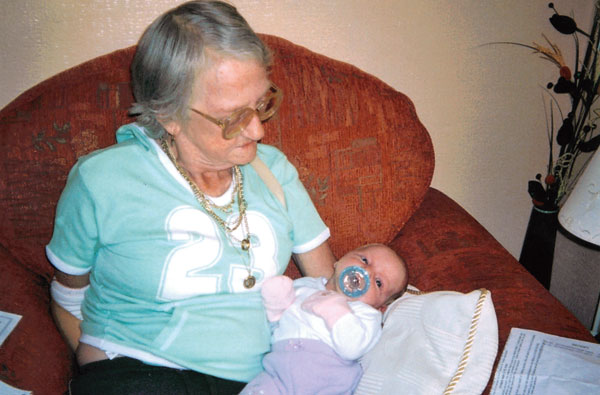
There are some things you inherit from your parents – eye colour, a wonky nose or straight teeth. But sometimes, the most important traits you have are the ones you learn.
My mum Jenni had taught me how to walk, talk, read and write.
Sounds like she was the same as most other mums, right? But there was something extra special about mine – everything she taught me, she’d done without her legs.
When she was 18, she’d been diagnosed with Crest syndrome. ‘It means my blood doesn’t go around my body properly,’ she’d explained to me. ‘Sometimes, when it doesn’t get to my limbs, they can go black and I have to have them removed before my blood gets infected.’
When my older sister Kelly was 18 months, Mum had her left leg amputated below her knee. Then when I was two, she’d had her other leg amputated.
As long as I could remember, Mum had been in a wheelchair.
And my dad Steven was always there to do the things she couldn’t.
Not that there was anything Mum couldn’t do. Walking into the kitchen after school, I’d see her hoisting herself up in her wheelchair, rummaging through the cupboards getting our tea ready.
You might think she’d be wallowing in self-pity, never knowing when or if she might lose another limb. Not Mum. She faced each day with a smile.
And when I came home from school one day aged 13, complaining about having to wear a skirt, she put things into perspective.
‘I’ve got horrible legs,’ I’d groaned miserably.
‘Just be thankful you’ve got legs,’ she’d nodded towards her own thighs. I could’ve kicked myself for being insensitive, but Mum didn’t bat an eyelid, just carried on whistling while she plugged in the vacuum cleaner.
As I got older, I started to think more about her condition. Luckily, me and Kelly had already tested negative for it when we’d had blood tests aged seven. But it didn’t stop me wondering what it must be like.
‘Doesn’t it scare you?’ I asked one day, gazing at the delicate skin cracking on her hands as she gripped a pen. The condition often caused her skin to tighten so much, she couldn’t stretch it out.
‘Why would it? I’ve still got arms to hold you with,’ she smiled, looking up at me.
That was true. Mum did give the best hugs. If I ever felt down or had my heart broken she’d be there with open arms.
There’s nothing quite like a good hug from your mum to make you feel better is there?
Only, by the time I was 18 and studying to become a health care assistant, something put a dampener on Mum’s cuddles.
‘Your fingers have gone black,’ I gasped, pointing at her right hand. In a matter of minutes, they’d turned from a healthy pink to a deep purple. Rushing her to the hospital, they had bad news.
‘We’ll have to remove your first two fingers,’ her doctor explained. ‘But, hopefully, we can save the rest of your hand.’
After losing her legs, it seemed like a small sacrifice to Mum, but I was horrified. ‘But… they can’t do that!’ I cried.
Mum rested her good hand on mine. ‘It’s just part of the condition,’ she smiled sadly. ‘I’m lucky, some people with it don’t get as long as I’ve had without more amputations.’
I gazed back at her stunned. Here she was being told she had to have her fingers cut off, and she still considered herself lucky.
I’d never seen anyone so brave.
Problem was, pretty soon the rest of Mum’s hand was affected. They had to cut it off at the wrist.
And because her bones continued to grow, every year she had to have her wrist and thighbones shaved back.
The ops left her in agony for days, but Mum carried on as usual.
When her left hand started to turn black three years later, though, she didn’t want to mess around.
‘We can try removing these two fingers…’ her doctor started.
Mum shook her head.
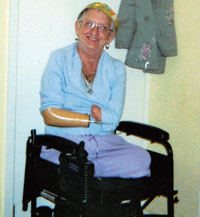
‘No,’ she said firmly. ‘Just take the whole thing off now.’
You’d think she was talking about pulling off a plaster, the way she said it.
‘W-what?’ he stammered.
‘I’m going to lose it eventually anyway,’ she sighed. ‘No point fussing about.’
So, that’s what they did. By the age of 53, Mum had become a quadruple amputee.
She was still as fiercely independent as ever, though. ‘I’m not a baby, Tammy,’ she’d frown if I tried to help cut up her food. ‘Here, pass me those.’
She nodded towards the leather gauntlets she now wore with a special fork and a hook.
I’d known her my whole life and yet she never ceased to amaze me. On my birthday, she gave me a card that looked like a child had written it with wobbly letters. She’d had to write with the pen in her mouth. ‘It might not be the neatest writing,’ she apologised. ‘But it’s mine.’
Even when I fell pregnant and split up from my boyfriend, Mum was a tower of strength.
‘Come home and live with me and Dad,’ she offered.
Sadly, Dad had been diagnosed with throat cancer, and passed away just a month before my daughter Abigail was born. But, as always, Mum was there, helping me and giving advice.
She’d hold Abigail in the crook of her arm, looking adoringly into her eyes. As the years passed, the pair of them were like peas in a pod.
‘Nana, can you read me a bedtime story?’ Abigail, four, asked one night, picking out a book about dinosaurs.
Leaning in, she whispered in Mum’s ear so I could just about hear her say: ‘You do the voices better than Mummy.’
Mum couldn’t help laughing at the offended look on my face as she wheeled her chair into Abigail’s room. I didn’t mind, though, I loved they were so close.
But something else had started to niggle at the back of my mind. We’d been told that most Crest sufferers didn’t live past 50. And although Mum insisted she was fine, when she was 57, I started to notice how drawn she looked.
Just a few months later, she was rushed to hospital. Her circulation had got worse, she could hardly breathe, and she had to be hooked up to machines and drips.
‘I’ve got to go and put Abigail to bed,’ I said gently before leaving her bedside that night. ‘I’ll see you tomorrow. I love you.’
Mum was so weak I didn’t think she’d heard. But as I walked out, she nodded gently. That was the last time I saw her alive. She died from breathing difficulties. Losing Mum was agony, but I had to keep things going for Abigail.
The worse part is, although it’s rare, Mum’s condition can be hereditary. I won’t be able to get Abigail tested until she’s seven.
It’s scary thinking she might go through what Mum did, but I know she’d cope just as well as her nana. She showed us what true strength is. And how to smile through the pain.
Tammy Howarth, 26, Farnworth, Gtr Manchester
Story search...
Story archive
Just added...
From chunky to hunky
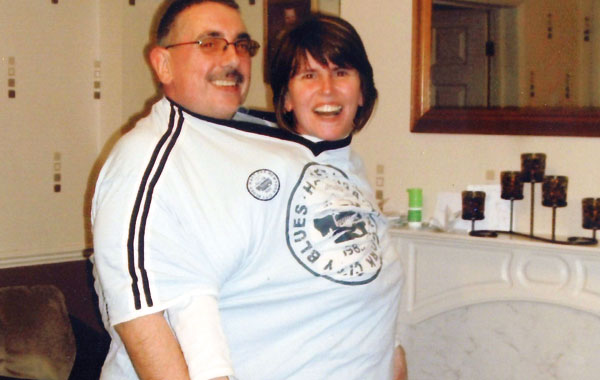
Cuddly Colin was too roly-poly to...
read more...
The boy of steel
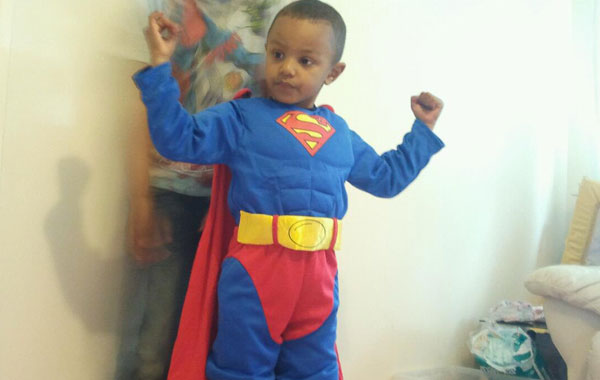
With his baby sister Holly to love,...
read more...
The great Moggy mystery
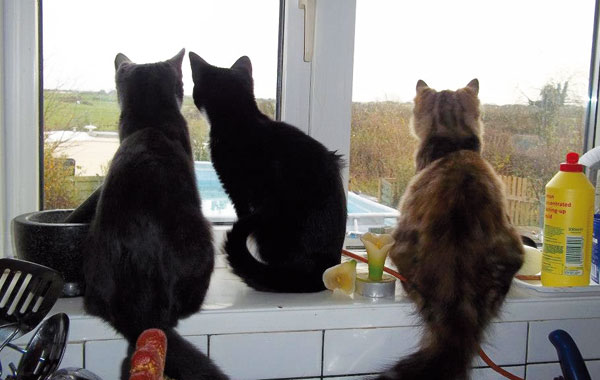
Just what was making all of our cats...
read more...
Most popular...
Quick reads...
No choccie, but life's so sweet!
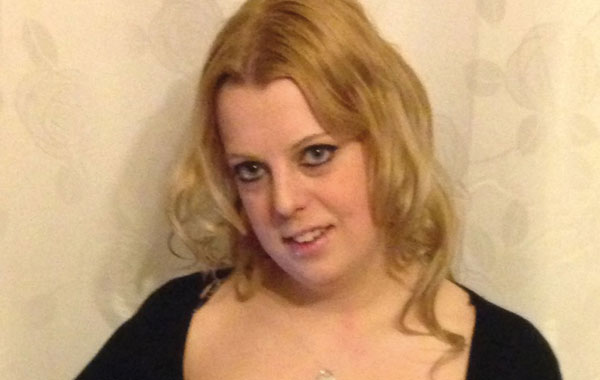
I'm a reformed chocoholic...
read more...
Baa-ck from the dead!
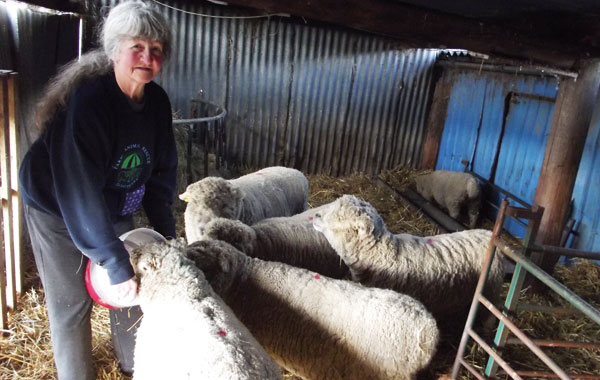
My heart bleated for these poor sheep...
read more...
Brave undertaking
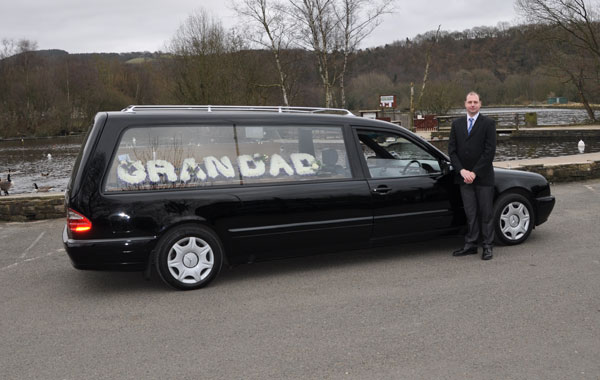
I've swapped cars for coffins...
read more...























